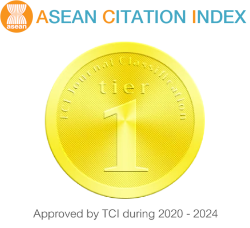Patient’s Perspectives on Quality of Emergency Medical Service and Related Factors in the Context of Decentralization
Keywords:
emergency medical service, decentralization, local administrative organizationAbstract
Emergency medical service (EMS) plays a critical role in reducing mortality and mitigating the consequences of emergency health conditions. Despite their importance, EMS systems often encounter accessibility challenges. In Thailand, a decentralization policy has been introduced, including transferring the function of provincial EMS dispatch center from provincial hospital of Ministry of Public Health (MoPH) to the provincial administration organization (PAO). This policy aims to enhance responsiveness and accountability to local government. This study investigated the patients’ perspective on quality of EMS from exploring the experiences, satisfaction and level of confidence in EMS between decentralized and status-quo provinces. Our findings indicated a statistically significant reduction in EMS utilization rates in the transferred dispatch provinces (transferred: 32.7%; non-transferred: 47.5%; p = 0.01). Furthermore, public confidence in future EMS uses was notably lower in the transferred provinces (transferred: 72.5%; non-transferred: 83.1%; p = 0.01). Despite these differences, no significant variation was observed in the satisfaction on operational performances of dispatch centers, ambulance services, and hospital emergency departments across the two groups. These findings highlighted persistent challenges in EMS provision under PAO governance, likely due to the differences of service delivery design and governance mechanisms between units under MoPH and under local administration. The results underscored the need for strengthened collaboration between the National Institute of Emergency Medicine (NIEM) and local governance bodies to address these challenges realizing the full potential of decentralization. Such efforts would optimize EMS delivery in accordance with local health priorities ensuring equal access to high-quality emergency care across Thailand.
References
Tadadej C, Mongkolsomlit S, Suriyawongpaisarn P. Evolution of emergency medical service systems in Thailand: a systematic review. J Health Sci [internet]. 2014 Jun 30 [cited 2024 Jun 25];23:513-23.
Suriyawongpaisal P, Woratanarat T, Tansirisithikul R, Srithamrongsawat S. Scaling up emergency medical services under the universal health insurance scheme in Thailand. Indian J Public Health Res Dev. 2012 Dec;3(4):220–5.
Suriyawongpaisal P, Aekplakorn W, Tansirisithikul R. A Thailand case study based on quantitative assessment: does a national lead agency make a difference in pre-hospital care development in middle income countries? Scand J Trauma Resusc Emerg Med. 2014 Dec 12;22(1):75.
Bhattarai HK, Bhusal S, Barone-Adesi F, Hubloue I. Prehospital emergency care in low- and middle-income countries: a systematic review. Prehospital Disaster Med. 2023 Aug;38(4):495–512.
Determining Plans and Process of Decentralization to Local Government Organization Act, B.E. 2542. The Royal Government Gazette Volume 116, Section 114 Kor. p. 48. (Nov 17, 1999). (in Thai)
Sutapak T. Evaluating emergency medical services of Ubon Rachathani province. Local Administation J. 2015;8(3):10-18.
Suryanto null, Plummer V, Boyle M. EMS systems in lower-middle income countries: a literature review. Prehospital Disaster Med. 2017 Feb;32(1):64–70.
Secretary of State for Health. High quality care for all: NHS next stage review. Final report. The Stationery Office; 2008. 92 p.
Baubin M, Neumayr A, Eigenstuhler J, Nübling M, Lederer W, Heidegger T. Patient satisfaction in out-of-hospital emergency care: development of a standard questionnaire. Notf Rettungsmedizin. 2012 Apr;15(3):225–33.
Neumayr A, Gnirke A, Schaeuble JC, Ganter MT, Sparr H, Zoll A, et al. Patient satisfaction in out-of-hospital emergency care: a multicentre survey. Eur J Emerg Med. 2016 Oct;23(5):370-4.
Srithamrongsawad S, Suriyawongpaisal P, Atiksawedparit P, Kaewkamjornchai P, Sitthirat P. Evaluating pre-hospital emergency care services in the context of decentralization policy. Faculty of Medicine Ramthibodi Hospital, Mahidol University; 2024.
Glick P. How reliable are surveys of client satisfaction with healthcare services? Evidence from matched facility and household data in Madagascar. Soc Sci Med 1982. 2009 Jan;68(2):368–79.
Morley C, Unwin M, Peterson GM, Stankovich J, Kinsman L. Emergency department crowding: a systematic review of causes, consequences and solutions. PLoS ONE. 2018 Aug 30;13(8):e0203316.
Oliveira R, Santinha G, Sá Marques T. The impacts of health decentralization on equity, efficiency, and effectiveness: a scoping review. Sustainability. 2024 Jan;16(1):386.
Fatile JO, Ejalonibu GL. Decentralization and local government autonomy: quest for quality service delivery in Nigeria. J Econ Manag Trade. 2015 Sep 9;1–21.
National Institute for Emergency Medicine. Provincial emergency medical services performance scoring index 2023. Nonthaburi: National Institute for Emergency Medicine; 2023. (in Thai)
Ministry of Public Health of Thailand. Health KPI [internet]. 2024 [cited 2024 Sep 26]. Available from: http://healthkpi.moph.go.th. (in Thai)
Suwanwela NC, Chutinet A, Kijpaisalratana N. Thrombolytic treatment in Thailand. J Stroke Med. 2018 Jun 1;1(1):41–4.
Aruga T. The status quo and future prospects of emergency medical service systems in Japan in view of the tight supply-demand situation for medical resources. Nihon Rinsho Jpn J Clin Med. 2016 Feb;74(2):187–95.
Alanazy ARM, Wark S, Fraser J, Nagle A. Factors impacting patient outcomes associated with use of emergency medical services operating in urban versus rural areas: a systematic review. Int J Environ Res Public Health. 2019 May;16(10):1728.
Downloads
Published
How to Cite
Issue
Section
License
Copyright (c) 2024 Journal of Health Systems Research

This work is licensed under a Creative Commons Attribution-NonCommercial-NoDerivatives 4.0 International License.
Journal of Health Systems Research is licensed under a Creative Commons Attribution-NonCommercial-NoDerivatives 4.0 International (CC BY-NC-ND 4.0) license, unless otherwise stated.




